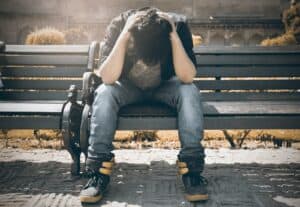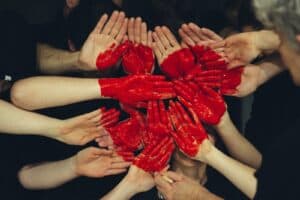“We’re taught to be ashamed of confusion, anger, fear and sadness, and to me they’re of equal value to happiness, excitement and inspiration.” ~ Alanis Morissette
There are times in our lives when ‘Living Just Hurts’…
We kn ow those days when it is hard to think of getting out of bed in the morning, getting dressed seems an unreasonable task, and the need to interact with others is overwhelming. It is hard to see any light at the end of the tunnel, and hope seems to be just another four-letter word.
ow those days when it is hard to think of getting out of bed in the morning, getting dressed seems an unreasonable task, and the need to interact with others is overwhelming. It is hard to see any light at the end of the tunnel, and hope seems to be just another four-letter word.
Whether we are feeling sadness, anxiety, depression, grief, loneliness, hopelessness or helplessness, there are times when every step in the journey of life can be excruciating.
“Some days, 24 hours is too much to stay put in, so I take the day hour by hour, moment by moment. I break the task, the challenge, the fear into small, bite-size pieces. I can handle a piece of fear, depression, anger, pain, sadness, loneliness, illness. I actually put my hands up to my face, one next to each eye, like blinders on a horse.” ~ Regina Brett
T hen there are those times when our heart breaks. When we experience rejections, disappointment, abandonment, or betrayal by a loved one, it can be so painful. It feels like we are dying. We imagine that anything would be better then feeling that pain.
hen there are those times when our heart breaks. When we experience rejections, disappointment, abandonment, or betrayal by a loved one, it can be so painful. It feels like we are dying. We imagine that anything would be better then feeling that pain.
We all know that rejection hurts, but neuroscience has concluded that it does in fact, literally, hurt. While the brain does not process emotional pain and physical pain exactly the same, MRI studies show that the the reaction and cascading events are very similar, and a natural chemical (painkiller mu-opioid) is released during both events. We now know this same experience occurs when an individual feels slighted or rejected by others.
Maia Szalavitz writes, ‘Sticks and stones may break your bones, but names can hurt just as much. Indeed, according to converging evidence reported in a new review in Current Directions in Psychological Science, physical and social pain are processed in some of the same regions of the brain’.
So yes, when we say that ‘our heart is hurting’, we actually are translating those excruciating emotional feelings as real pain. No matter, heart-breaks are so hard and devastating that it can make us feel that we can not take it any more.
Grief and bereavement can be so overwhelming, that it does feel that ‘living hurts’. At times of grief we go through waves and cycles of denial, anger, depression, hopelessness and helplessness. Grief can bring feelings of shame, blame, guilt, regret, and depression.
“The five stages – den
ial, anger, bargaining, depression, and acceptance – are a part of the framework that makes up our learning to live with the one we lost. They are tools to help us frame and identify what we may be feeling. But they are not stops on some linear timeline in grief.” ~ Elisabeth Kubler-Ross
Coping with losing a loved one is one of life’s great difficulties. If you have experienced the pain of mourning, you know that any way to ease the loss is welcomed. While our knowledge and study of grief continues to evolve, it’s important to note that not everyone grieves the same way: we have individual patterns and outlets for grief.
We feel so alone in our loss, that it is crucial to be reminded that we do not need to do it alone. At times it feel that no one can understand us.
Life’s transitions, can also bring a sense of emotional devastation and overwhelming stress and sorrow.
It can happen with aging; sometimes we lose our health, we realize we have to learn to slow down. At times retirement can be scary and anxious with a loss of identity; when the kids leave home and go to college or they just move away, we feel the empty nest.
Those events can result in unbearable emotional pain, and at times we lose our sense of meaning in our life.
At times, we do not even know why we are feeling anxious, depressed, lonely, alone. It is just there, weighing heavy on our heart. We feel we just want the pain to stop. We want it to go away. We need HELP.
 When Living Hurts, you do not need to do it alone. Reaching out to a friend, someone in the family, a tribe or a community member, can help us carry the load of the grief, the loss, the sadness. Reaching out reminds us that we are not alone.
When Living Hurts, you do not need to do it alone. Reaching out to a friend, someone in the family, a tribe or a community member, can help us carry the load of the grief, the loss, the sadness. Reaching out reminds us that we are not alone.
We need to master the courage to say ‘I need HELP’.
At times of troubles we need to be able to turn to our loved ones. Loneliness can intensify helplessness and hopelessness feelings. We can not do life alone. Our DNA codes loneliness and isolation as a threat to our survival.
Few weeks ago, the Oroville Dam was being compromised and it forced emergency widespread evacuation. It was tense and scary. One of the couples in our January Hold Me Tight workshop was affected by the evacuation. They wrote me this testimonial:
“Thank you for your email. We live above the Dam so we were safe, however trying to get all of the family up here in one hour was extremely stressful.
We were very grateful that the turn of events turned out better than anticipated. Thankful for the work we did at the workshop, we found that in this extreme situation we both turned to one another for support, comfort and strength. We would like to thank you once again for the powerful, uplifting and life-changing weekend. It has done miracles for our relationship and we continue to grow from it daily.”
Our March Hold Me Tight workshop is Sold-Out!!! We will offer another one soon, please go to our contact me page on the website and join our mailing list to be notified about our next Hold Me Tight Couples Workshop event.

Blessings for the upcoming spring…
with warm regards,
~ Dalia
(530) 692 0680
dalia@daliaanderman.com
http://daliaanderman.com/workshops
https://www.facebook.com/DaliaAndermanMFT